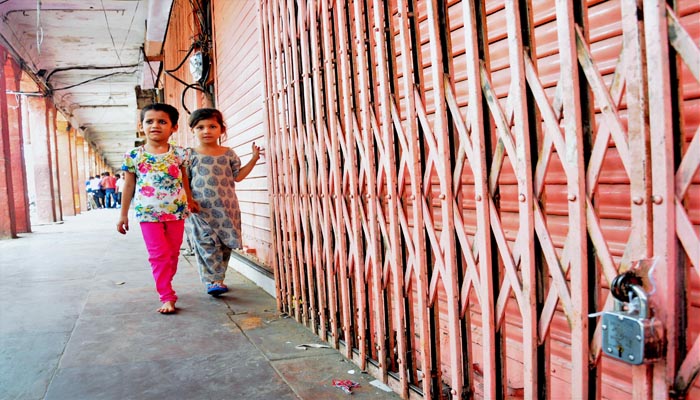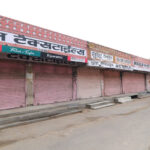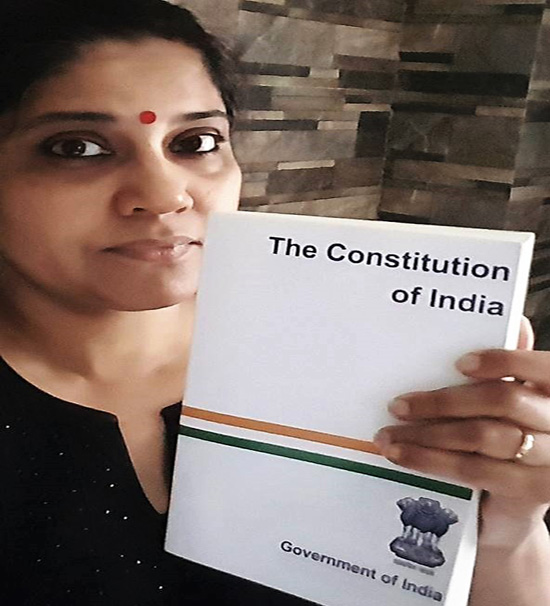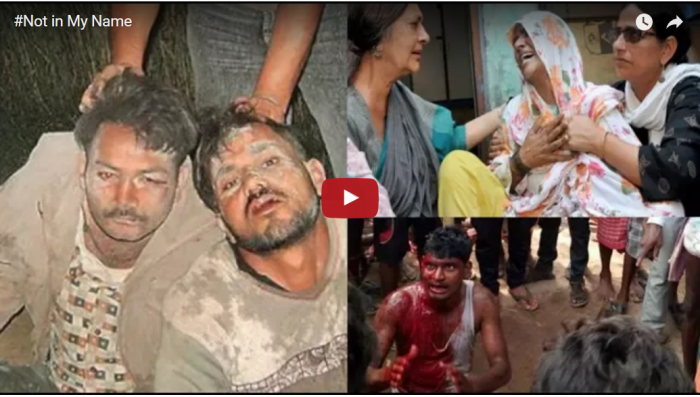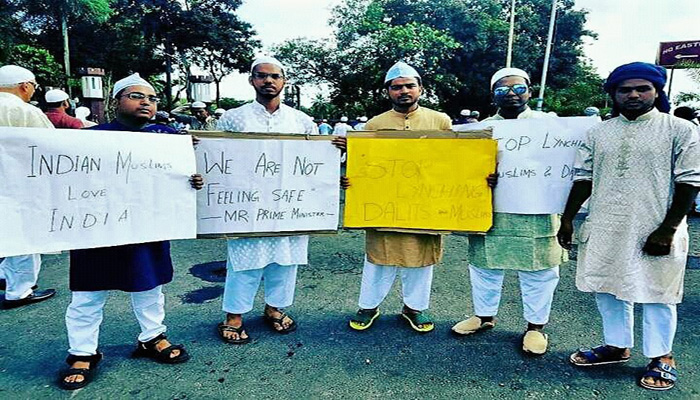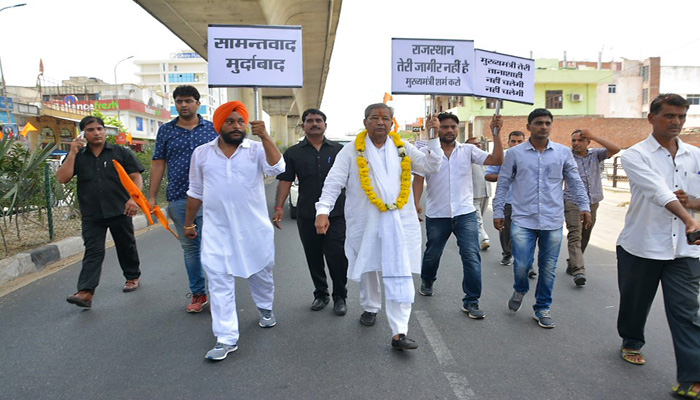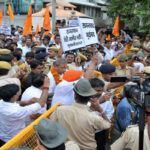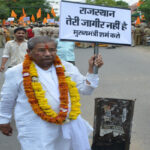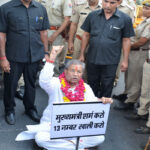Jaipur textile business shuts down over GST
Because of lynchings, I fear for my son: Renuka Shahane
Kolkata: The horrific incident of Junaid, a 15-year-old boy lynched inside a train coach, has moved people from different background across India and outside. Actor Renuka Sahane is one of them. She, has been a regularparticipant for most of the protestsIndia has seen in recent times. Renuka, claims that under present circumstances, “She fears for her elder son, who will turn 16 next year.”
The day, India chose to hold a protest—Not In My Name, to show its collective disgust for all the recent lynching cases, right from Usman to Junaid to Ayub to Zafar toNaim to Gautam, Ganesh, Pehlu andAkhlaque, Renuka posted a moving piece on her Facebook profile.
In the beginning of it, the actor clears that, she does not want to see the religion of victim and killers, but there was a mob, who killed a human while people watched them being lynched.
“Junaid was lynched by a mob of cruel human beings. I don’t care what religion those lynchers belonged to. Nor do I care what religion Junaid belonged to. I only care about one thing. A group of mean, cruel human beings killed a teenager and assaulted three other young men brutally!” she writes.
And then she shares her fear, some what similar to what Kiran Rao, wife of actor Aamir Khan had feared a year ago. Kiran had also added that she sometimes thinks to leave the country. Her comment had made campaign against him.
“Junaid was 16. My elder son will turn 16 next year. My heart breaks for Junaid’s mother.”
Renuka also wonders on the silence of the people when incident took place and also, what makes many justify it.“Not only did a group of cruel human beings kill Junaid, another group of cruel human beings egged them on. Junaid was also killed by those cruel people who witnessed the insanity & chose to remain silent,” her post reads.
“There are some cruel people who justify this lynching. Yes! Hate allows for all sorts of justification,” she rues.
The actor being a concerned citizen also raises question on what happened to perpetrators? “There has been a long list of these lynchings. It has become so common that no one talks about it. Nobody asks questions about what happened to the perpetrators. Whether they were caught & given the strictest punishment or whether they were released to unleash more violence!”
She continues, questioning such mentality which kills innocent, unarmed people and the justification, “I cannot fathom how anyone can kill unarmed, innocent human beings! I cannot fathom how people can justify this horrific violence! Instead of taking law into their own hands why are police complaints not made? Is it because the lynch mob knows that there is no reason behind what they have done? All they want to do is to kill in the name of hate.Whichever religion, ideology, language, ethnicity you belong to, lynching done in any name cannot be condoned!
Renuka mentions that because of hate, humanity has seen many riots, terror attacks. She writes, “We’ve suffered so many riots, terrorist attacks, pogroms, lynchings but we haven’t learnt anything. The bottom line is that innocent human beings become the target of that hate. They are usually poor. They are usually those who are incapable of fighting back. It is really too, too disheartening. Innocence dies when hate rules!”
Finally, the actor, who is also a mother declares, “I cannot be a part of those who encourage hate.”
“I was with the Ekta Manch marching from Parel to Azad Maidan singing ” Hum hongey kaamyaab….” to promote brotherhood between fellow citizens of all faiths in 1993 after the horrendous riots followed by the heinous bomb blasts in Mumbai. I marched to the Gateway of India to protest the utter failure & crass mishandling of 26/11 by the then Congress Govt in the State and the Centre in 2008. I supported the Anna Hazare anti corruption movement when he waged the civil battle against the UPA 2 Govt at the Centre. I was vocal about women’s safety after the horrendous rape & murder of Jyoti Singh as well as Pallavi Purkayastha as well as the sickening hacking of Swathi,” her post reads.
And she minced no words in telling that, the lynching incidents have political patronage, “Today I stand firmly against the lynch mentality that has an active political patronage in our country.”
Because the actor knows, she will be quickly questioned for her fear as mother, Renuka pointed out that she does not belong to any political party, but believe in Indian Constitution. She also shared her picture with the constitution. “I do not belong to any political party. I am a citizen of one of the finest democracies in the World. That is why it is so important for all of us to respect & protect the tenets of our Constitution. I, as a proud citizen of India, do not conform to the views of anyone who actively or passively supports this lynching. My allegiance lies with the Constitution of India. If the Govt or any other body does anything to undermine the basic tenets of democracy in our country, I will vocally oppose it,” she writes.
“I will not be a part of this hate!I do not want my children to inherit this hate.
I will not have the blood of innocents on my hands,” Renuka, the mother concludes.
The actor begins her post by saying NOT IN MY NAME, and ends with it too.
India stand against lynching and Mobocracy
Kolkata: It took a 16-yr-old Junaid’s lynching, to wake the nation out of its slumber. Citizen across the country raised their concern over increasing mob violence and lynching culture.
Junaid, a minor with his friends was returning to his home after Eid shopping. But inside train, which was a first time, he was lynched and no one from the compartment, stopped the mob which ultimately took away another innocent life in lynching, in India.
[embedyt] https://www.youtube.com/watch?v=0wzk3e4peWI[/embedyt]
Jharkhand lynching victim is alive and recovering
Giridih: Jharkhand Mob lynching victim was attacked over a rumour of cow killing in Deori block of Giridih district. The victim is injured and undergoing treatment in Dhanbad. Usman, a dairy farmer, was not just lynched by a mob comprising 1000 people, but also set his house ablaze, leading to confusion whether Usman was dead or alive.
Giridih Superintendent of Police Akhilesh Variar confirmed to eNewsroom that Usman is alive. “He (Usman) is alive and recovering,” said the SP.
The timely intervention of Giridih police, saved Usman, and his family. Some family members and police also got injured in the incident. The police had to fire several rounds of bullets in the air to disperse the mob. Sources said, one attacker has also hit police bullet at his leg.
The mob lynching, now a norm in India, found another excuse on Tuesday, when the found carcass near Usman, a dairy farmer’s house. A resident of Beria haat area, in Deori. Sources reveal that one of Usman’s cow had died, which he dumped near his house on Monday. In the night, some stray animal mutilated the body of the body.
On Tuesday, when people gathered around his house and began inquiring about the dumped carcass? Usman accepted it was his animal and following which the mob announced to kill him and his family. They set ablaze his house and beaten him.
However, on receiving information, Giridih police reached on time Led by Sub-Divisional Magistrate (SDM) Ravi Shankar Vidyarthi and other police officials. The crowd pelted stone and police had to open firing to disperse the mob.
There were total ten cows at the cowshed of Usman, and rest nine were taken away by the mob during the incident.
On Wednesday, Dhanwar MLA and CPI-ML leader, Rajkumar Yadav met Usman and other injured at Central Hospitals, Coal India, Dhanbad.
It is the second incident in Giridih, where police has averted a crisis created by Gau Rakshaks. Earlier, when cows were being transported on Bengabad road, gau rakshaks had attacked the vehicle, saying that there a dead calf in the truck and that the animals were being taken to slaughter house. In the incident, local BJP MLA Jai Prakash Verma had also sat on dharna. Later, police had to fire in the air to disperse the gathering, which were prepared to attack the driver.
However, in another part of the state, victims were not so lucky. In the presence of police, seven people including a 75-year-old woman had been lynched near Jamshedpur over child lifting allegation.
Outside Jharkhand too, others are not so lucky and within a week a 15-year-old Junaid, was beaten to death inside a train compartment at Ballabhgarh. And prior to him, Zafar Khan, a social activist was lynched, surprisingly, this time by government officials in Rajasthan.
The Giridih and Gandey unit of CPI-ML leaders led by Rajesh Sinha and Rajesh Yadav, hold protest marches today over Deori incident at Giridih headquarters.
While the former CPI-ML MLA Vinod Singh demanded compensation from government for Usman and his family. He also appealed to people not to become part of mob and restrain themselves in such situation.
Because of the rise of lynching incidents specially against minorities, on Eid, large number of Muslims across India, had sported black bands as a sign of protest.
Today, a campaign Not In My Name is being conducted in many cities, including Delhi, Kolkata, Lukhnow against the ongoing lynching of Muslims and Dalits on mere suspicion of eating beef or involve in cattle trade.
People rise against lynching: Silent protest on Eid, next Not In My Name
Kolkata: While the Muslims from across India, tied black band during Eid to protest mob lynching Muslims from Kolkata gathered at the iconic Red Road for the Eid namaz on Monday morning. The overcast sky spelt the mood of Muslims, assembling for the traditional namaz to flag off Eid celebration. Many were seen carrying placards, which they displayed post namaz.
Kashif Zafar, general secretary, of Garden Reach Peace Movement Society, one of the silent protestors, said, “We did a silent demonstration at Red Road. Eid is a day of celebration, but in the wake of recent mob violence, there is a sense of helplessness, insecurity and sadness. We have staged this silent protest, as we want the government to break the eerie silence that it has been maintaining over the culture of mob lynching.”
If post namaaz, Zafar and others staged a protest at the Red Road, then in the evening, a silent protest – Concern Against The Rise Of Global Communalism, was organised at the Iran Society, in Kolkata. This meeting which had around 100 people attending the meeting, had political leaders from different parties, lawyers, artists, educators and more, assembling together to ring the alarm bell.
“There is a huge rise in fanatism globally. This meeting is to address the issue of fanatism, in both radical Islam and Hindu fanatics. The idea is to come up with some solutions that can repair the decaying pluralistic fabric of India,”Ritzu Ghoshal, a Kolkata-based lawyer, and spokesperson of West Bengal Pradesh Congress.
Ghoshal also said, “We are going to organise many more such meets, which has a single aim – Making the Prime Minister of India, understand his raj dharam of addressing, the issues like rise of mob lynching culture. A scenario, where certain Indian citizens don’t feel threatened to practice their religion or have food of their choice.”
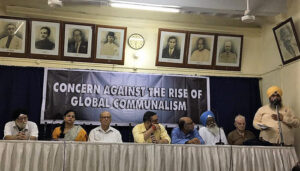
Mahinder Singh Gill, Presidentof federation of WB Truck Transportation Association, who was also present at the protest meet, said, “We want to create a secular forum, which will travel to various areas and promote secularism. Today, there is a huge need to address the issue of mob lynching culture. If this culture continues, then country will be itching towardsits doom. If the gaurakshaks, will get a free hand, then we will be following the path of destruction that our neighbouring countries like Pakistan and Afghanistan have followed. We the government need to curb such communal unrest with a hand of steel. We don’t need to talk only about cows or its safety, when we have issues like unemployment, inflation, farmer suicide and more socio-economic issues to be taken care of.” Gill, wants to campaign across India, to mobilise people about national unity, to promote secularism and make people aware of the fake and biased news.
Such silent protest was also staged in Mumbai also. Speaking on the same, Mufti Manzar Hasan Khan Ashrafi Misbahi, the chief Mufti of Madrasa Darul Uloom Ali Hasan Ahle Sunnat, said, “We had also observed a silent protest after Eid’s namaz, as we want the government to address this issue of mob lynching. The numbers of those killed in such violence is increasing. We are also the citizen of the country and the government should do the needful for our safety.”
“We don’t just want the PM to break his silence, we want him to do what needs to be done for the betterment of the nation. As, Vajpayee ji during the Godhra carnage, had indicated that the then CM of Gujarat should do his duties. We, at the moment want him to understand his duties towards, that section of the country, who is living under the constant fear of being lynched or killed, just like that of Junaid, who was stabbed to death just before Eid. We just can’t continue being a silent nation,” added Ghoshal.
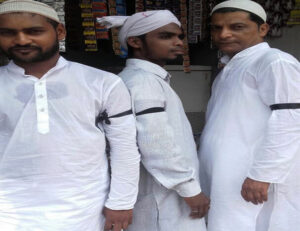
There are other protest lined up like Not in my Name – Kolkata citizens are coming together on 28 June to protest against the targeted lynchings of Muslims going on countrywide, the latest being of 16 year old Junaid on 23 June 2017 in Delhi (NCR).
The event which is being organanized without any political affiliation, asserts that the killings and the hatred being unleashed are Not In Our Name. There will be music and poetry to register the protest.
Veteran BJP MLA protest against Vasundhara
Jaipur: Ghanshyam Tiwari, a veteran leader of Bhartiya Janata Party, Rajasthan staged a protest against Chief Minister Vasundhara Raje on Sunday. He was demanding her to vacate the 13 number Bunglow at Jaipur. Tiwari, a five time MLA, who has been sidelined by the party even after winning the last election with the highest margin, is alleging that the CM wants to usurp the bunglow. This year, Rajasthan government has enacted a law, which entitles a former CM to stay in a entitled to a bunglow, of a cabinet rank minister. He has also been alleging ‘loot’ during the regime of Raje. He also termed, the CM, the ‘indisciplined queen’. While marching towards Raje’s residence, the 69-year-old leader and his supporters were carrying interesting placards. BJP’s disciplinary committee has showcaused Tiwari. However, the 69-year-old leader was not allowed to protest along with his supporters and were removed from the place.
Termed as appeasement, Mamata bags UN award for Kanyashree
Kolkata: Kanyashree Prakalpa, a pet project of Bengal’s Chief Minister Mamata Banerjee, initiated to stop girls dropping out of school and early child marriage, has often been criticized as ‘appeasement’ policy, went on to win the first position at the United Nations Public Service Award in the category, “Reaching out to the poorest of the poor in the society”.
The project launched way back in 2013, is one of the many projects launched by the Bengal chief minister, in which monetary transfers are directly made to the beneficiaries. Under this programme, girls aged 13 to 18 are eligible to receive an annual sum of Rs 750 to pursue her education. Once a beneficiary turns 18, she gets a one-time grant of Rs 25000. This scheme has definitely yielded result in cutting down the number of early marriages in the state. Till date, around 40.33 lakh girls have been benefitted by this scheme.
Minute after the being awarded, Mamata took on to twitter. Her jubilant tweet read, “We are delighted on behalf of our countrymen and the people of Bengal to receive the first prize on @UN Public Service.”
She said, “It is indeed a historic achievement and a proud moment for the people of West Bengal and India.” While her FB post read, “The prestigious award is in recognition of excellence in public service for sustainable development, innovation and our commitment to leave no one behind in the development agenda of our government.”
The UN recognition for this scheme, can be considered a befitting reply from Mamata to her trolls, who often ridiculed her for claiming that Centre’s Beti Bachao, Beti Padhao, scheme had been modeled on Bengal’s Kanyashree.
The award couldn’t even stop opposition from acknowledging Mamata’s work. Her biggest critic, Adhir Choudhary, Bengal state Congress president conceded by saying, “If the United Nations has given this award, then it is appreciable. But then there are other schemes there too. We need to study, how the selection has been made.” On being reminded that earlier UNICEF had also acknowledged the same scheme, he said, “Then it must be appreciated.”
Saradindu Banerjee, president of Kolkata-based NGO space said, “Kanyashree project has now become a ‘global model’ for girl a student, that’s indeed a commendable job done by the state government.”
At a time, when many are doubting the effectiveness of government policies, Bengal’s Kanyashree’s success, shows how a government policy can be turned into a success.
‘Uncle’ Aamir and Dangal’s historic success in China
Kolkata: The story of three engineering students—3 Idiots had established Bollywood actor Aamir Khan in People’s Republic of China (PRC), and a story which narrates the tale of woman empowerment– Dangal has made Khan, the biggest ever box office income earner in the world second largest economy.
“I had liked his 3 Idiots very much and watched that movie twice. This time the story of girls how they overcome their challenges to win medals for their country was main USP of the movie and I enjoyed watching how they trained hard to achieve their goals in life,” Eric Lin, a native of Taiwan, who works in China told eNewsroom.
“The scene in which the girls have to choose between marriage and career, moved me. It was different movie from other Bollywood movies, as it had little distractions like the regular, songs and dance,” added Eric.
Chinese social media sites are having full of praise, for the biographical sports drama Dangal and Aamir Khan. The movie tells the story of a father, Mahavir Phogat, a wrestler, who had four daughters. Mahavir, train all her daughters into wrestling. Among them, Geeta Phogat and Babita Phogat won Gold and Silver medals respectively in Commonwealth Games in 2010. Actor Fatima Sana Shaikh and Sanya Malhotra essayed the role of grown up Geeta and Babita.
“I haven’t seen such a movie that excited me. The movie is full of power, and it made me laugh and cry. The movie shows us father’s love, the dream and the encouragement of overcoming all difficulties,” a Weibo user posted in Chinese.
China permits only four Indian movies to be released in the country, while it allows 38 Hollywood movies.
Dangal was released on May 5, 2017 in 9000 screens across China. It has earned whopping 1.279 billion yuan ( Rs1200 crores) in PRC, which means Aamir’s blockbuster broke the Box Office record of Chinese movie Lost in Thailand, and now standing at the 16th position among the highest earned 50 movies of all time in China. Dangal now stood just behind the Hollywood movie Avatar. Lost in Thailand had earned 1.272 billion yuan while Avatar had 1.340 billion.
Aamir Khan, who has a Weibo account has thanked people of Chinese for their love and support to Dangal movie.

The discussion about Dangal on social media site, Sino-Weibo is also dominating all topics, it has 5429 followers, and astonishingly 460 Million people have read it. And on Friday 35000 people were discussing about it.
Most people are in awe with the dedication of Aamir, the Mr Perfectionist of Bollywood. Some also thanked Khan, for always touching on social issues and enlightening people.
In fact, even the President of PRC, Xi Jinping has watched Dangal and according to a report, he even told Indian Prime Minister Narendra Modi that how much he liked the movie.
Chinese people affectionately call the 52-year-old actor as, Uncle Aamir!
The movie, even after 47 days, is still pulling Chinese crowd.
“Because of having a very hectic work schedule, I could not watch Dangal, but this weekend, we will sure watch it,” added Anne Pan. So is Ren Wen, “I had watched 3 Idiots many years back and will soon watch Dangal.” And the list is long.
No salary for Jharkhand teachers during maternity leaves
Ranchi: Aarti, who is on maternity leave has become mother recently, but she is very tensed these days. The reason which is spoiling her the happiest moment in life is a phone call from her bank. The bank manager informed Aarti that it has been three months, and loan installments are not being deposited into her account, so it will be under NPA (non-performing asset).
Actually, Aarti is on maternity leave for 26 weeks, but even being a paid one, she is not getting salary since she started availing it.
The Education Department, Jharkhand does not give salaries to its female employees who remain on maternity leave, during the period, and only after six months when she resumes the job, the process of salary begins.
But, all these will now, make Aarti’s loan NPA, and not only she has to pay fine, but her loan credit points will be in negative.
“Then also, it takes more than a month or two to get salary started,” informed Sushmita Banerjee, who resumed job in the month of February and her salary could only get started again in April.
For some others, like Soni, who had taken maternity leave, in 2016, it has been more difficult. Soni, after resuming job, had to sit on dharna, before District Education Officer (DEO), to get her salary started again.
“Which means, you do not get salary, when you need it most. There is surgery cost, and new natal care, and several other expenses of medicines and tests. And as most of the teachers have got bank loans too but even being paid leave, we do not get salary on time,” rued Banerjee.
Like any other state, Jharkhand’s education department has got more number of female employees than any other departments.
According to National Study on Working Conditions of Teachers, Report for Jharkhand published in 2015, there were 33198 regular female teachers for elementary education in Jharkhand in the year 2011-12, and 7984 female regular teachers for secondary classes. There were two more occasions when teachers were recruited on regular basis in Jharkhand, post 2011-12. Additionally, in January 2016, more than thirteen thousand new regular teachers have also joined and among them half are females. Making total number of female regular teachers more than 60,000 thousands in the state.
While, in an estimate, around 500 teachers avail maternity leave across state, every year.
“First we do not get it when we need it most, and thereafter when it get accumulated because of corruption in Jharkhand, babus want commission to clear it,” added Soni.
It’s a similar kind of decision like union government, in which sanitary pad has been taxed, considering the menstrual cycle pain of fairer sex a luxury.
However, there is no such rule in Jharkhand Police, and its employees’ salaries do not get discontinue during maternity leave.
“Our salary did not get discontinued during maternity leave and we never faced such humiliations while being on leave or after resuming job,” claimed Kusum Kumari, a constable.
Ironically, education department’s higher officials have no idea about it, “I have not heard about it, but if it is happening, there must be orders from personal department,” Aradhana Patnaik, Secretary, Human Resource Development (HRD) told eNewsroom, over phone.
When contacted Personal Department, they said, there is no such order, “Maternity leave is a paid leave and like other leaves, in which salary did not get cut, it should also be continued, there is no such order to not to give salary during maternity leave from us,” Sunit Kumar, Under Secretary reacted to eNewsroom.
Note: The names of teachers have been changed on request.
Zafar Khan lynching and Raje’s demise tweet
Jaipur: Zafar Khan lynching has not only exposed the Pratapgarh Municipality’s hatred against Muslims, but ignorance of Rajasthan chief Minister Vasundhara Raje also, who used ‘demise’ insisted lynching, murder for Khan,
[embedyt] https://www.youtube.com/watch?v=EOKBgahq5k0[/embedyt]


